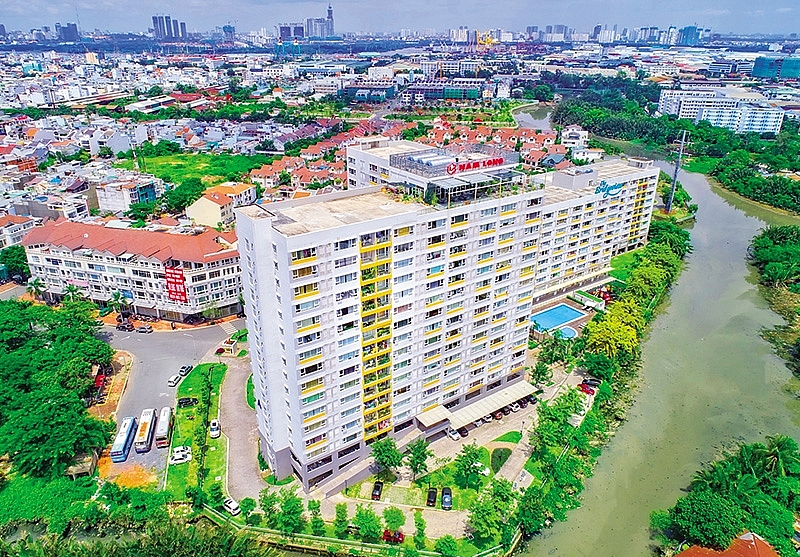
Listed real estate firms are looking for more foreign investment so as to swell their markets and strength. (Photo: Le Toan)
In order to gain a target of VND110 billion ($4.78 million) in after-tax profit this year, the listed Netland plans to make the call for funding from international partners.
According to Nguyen Huu Quang, Netland’s deputy general director, the company has been seeking cheap capital sources outside the country and co-operation with foreign financiers in order to expand its markets.
“Many have poured investment into the real estate sector in Vietnam, and this is a very important channel for domestic companies like Netland to increase our financial capacity,” Quang said.
Netland so far has three strategic partners, including Sanei Architecture Planning, G-7 Holdings Inc., and Anabuki. Sanei. They have been in collaboration with Netland in developing property projects in Vietnam.
Sanei, Quang said, is a Japanese investor interested in five Vietnamese projects with total capital of around $50 million. Another $100 million is hoped for use in Vietnam this year and Netland is hoping that it can obtain this sum soon.
In its development strategy, Netland would focus on key markets such as Ho Chi Minh City and Hanoi, as well as new markets such as Ba Ria-Vung Tau, Long An, and Can Tho as well as overseas markets including Japan.
In addition to township ventures and high-end apartments, the company will develop coastal hospitality real estate projects in the likes of Binh Thuan, Danang, and Nha Trang.
Nam Long Group, another listed company, is also co-ordinating with Japanese groups Hankyu Realty and Nishi Nippon Railroad in financing many property projects in Vietnam, such as the 26-hectare Mizuki Park and the 8.5ha Akari City in Ho Chi Minh City, and the 355ha Waterpoint Township in the Mekong Delta province of Long An.
According to a recent report released by Saigon Securities Inc. (SSI), listed real estate companies ended 2018 with rather stable development. Outstanding names include Vinhomes JSC, Nam Long, Khang Dien House Trading and Investment JSC, Dat Xanh Group, and Novaland.
Driven by strong sales between 2015 and 2017, most commercial real estate developers enjoyed decent earnings growth last year upon delivery of their sold units.
SSI predicted that there will be no sign of sharp recession in real estate. “We expect that positive economic indicators, high foreign investment inflows, a rising middle class, and strong remittances may continue to be key factors helping to sustain the real estate market. As such, the residential demand will likely continue throughout 2019,” said an SSI official.
“We believe that the demand for more affordable housing is still outpacing supply in the low-end market. As such, affordable housing is expected to continue driving the market, backed by a long-term downward trend of overall household size and available mortgage types with flexible schemes.”
The official continued, “Meanwhile, foreign investment flows into real estate are also expected to continue with upward momentum in 2019, as a lot of investors are opting for Southeast Asia, including Vietnam, to be prime candidates for investment amidst the ongoing US-China trade dispute. That would also be another pillar of support for real estate demand, whether in industrial, commercial, or residential properties, and especially the case in the high-end real estate market.”
Meanwhile these developers’ key focus is the residential market in Ho Chi Minh City, which has been going through a difficult procedural slog due to delayed licensing procedures throughout 2018. Therefore, maintaining higher growth in 2019 is quite challenging for them, the SSI official added.
Meanwhile a positive market still remains set for 2020 based on the positive view of macroeconomic and geographic indicators.


















